In Columbiana, Ohio, the Nicest Place in America in 2019, Nobody Gets Left Behind
Updated: Aug. 09, 2021
In Columbiana, Ohio, nobody gets left behind, from blue-collar workers, to the wealthy, to folks who sometimes need a little extra accommodation.
Live in a place where people are nice and treat each other right? Tell us about it and your town could end up on the cover of Reader’s Digest!
Everyone in Columbiana knows Ryan Houck. He’s not a politician or a prominent businessman or a beloved local doctor. He’s not the baker who donates freely to support causes of every kind. He’s not the real-estate developer who offers a year rent-free to promising entrepreneurs who may not have the resources to get started on their own. And he’s not the local philanthropist who returned to town after a lifetime away and donated $500,000 to rebuild the beloved Firestone Park.
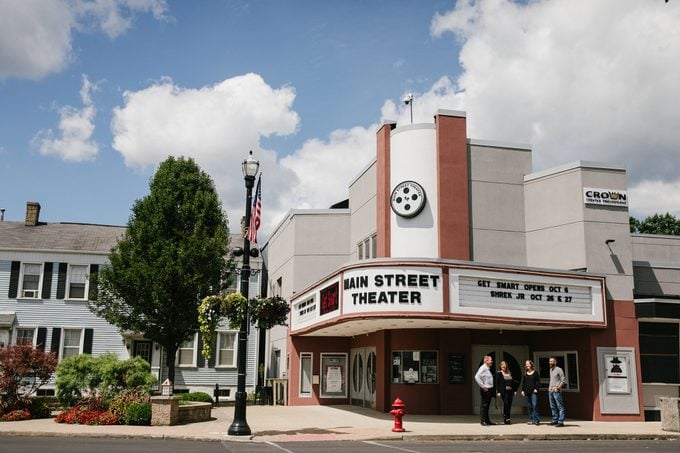
He’s just a kid. And when you talk to his parents, they’ll tell you that on most days he doesn’t do much. He has a rare disease called Miller-Dieker syndrome that has limited his ability to move or speak. But that’s not why people know him in this growing town of 6,200, about 80 miles southeast of Cleveland. They know him because he’s a star.
When Ryan was born, his diagnosis sent his parents Dan and Meghan reeling.
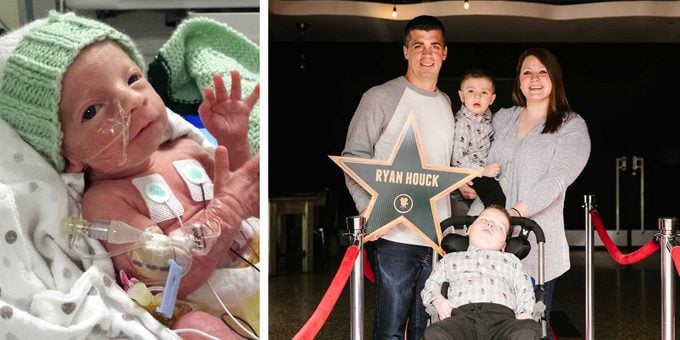
“All the dreams and aspirations you had for your child kind of vanish,” Meghan says. “We lost that hope of seeing him play in a baseball game or going to his school programs and seeing him on stage.”
The Houcks retreated into themselves and mostly stayed at home with Ryan. They didn’t even discuss how they felt about Ryan’s diagnosis for fear of upsetting each other. Then, in 2015, when Ryan was just 18 months old, a local company called Crown Theater Productions announced that it would be putting on a musical and that all the actors would be people with special needs. The show was Disney’s The Little Mermaid, and the company needed someone to play King Triton, the merman-demigod who wields a lightning-shooting trident. The director thought Ryan would be perfect for the part.
So, one night in October, Ryan went on center stage, strapped to his mother, and acted out lines boomed by his father backstage. He stole the show.
“It was like watching him hit that home run that we thought we would never get to see,” Meghan says.
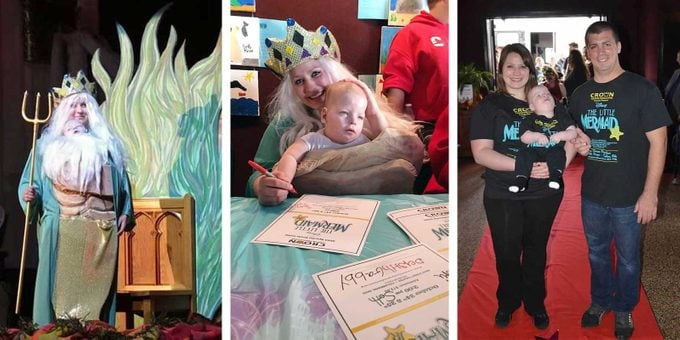
Nestled in the green, rolling hills of eastern Ohio, about halfway between Cleveland and Pittsburgh, Columbiana is a small town that’s been going through some changes. Downtown, restaurants now outnumber antique shops. There’s a new housing, golfing, and shopping development where Firestone Farm once stood. Men who used to gather for coffee in the morning outside of a place called Newtons now do it at McDonald’s, or not at all.
But one thing isn’t changing: Nobody gets left behind, from blue-collar workers, to retirees, to folks who sometimes need a little extra accommodation. In Columbiana, our Nicest Place in America for 2019, giving back without wanting anything in return is a way of life.
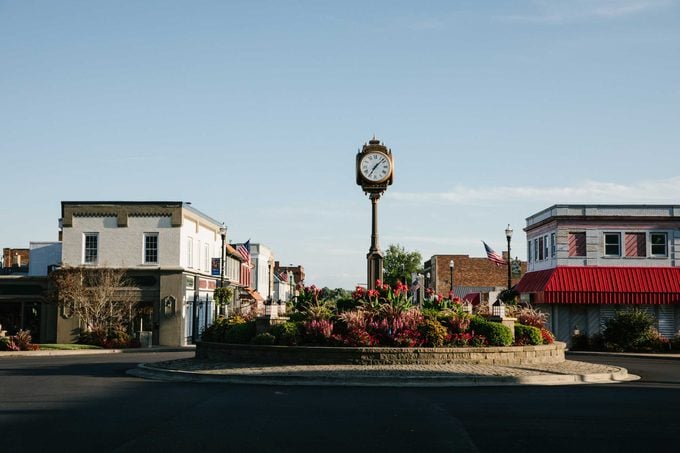
A spirit of community infuses this town, just as it has for the better part of a century, ever since tire magnate Harvey Firestone donated 52 acres of land to create the sprawling Firestone Park. Time and again, residents come together to boost their neighbors, whether it’s volunteering with Project MKC to deliver diapers to needy moms or donating money to help the Columbiana Community Foundation offer more service grants.
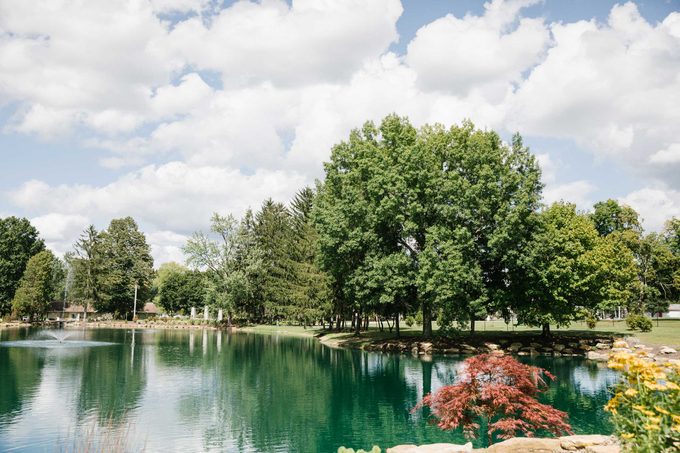
Greg Aker, a pastor at the Upper Room Fellowship, a church in town, says that in Columbiana, no matter your station, you get pulled along by your neighbors’ kindness. “Whatever you did for the least of these brothers, you do unto me,” he says, quoting Jesus, adding quickly that “brothers” in this case is everyone, not just the faithful. “Columbiana is a community imbued with faith, but you don’t need to be a person of faith to be embraced by the community.”
“A certain morale, an ethic, is instilled in everyone here from a young age,” is how Mayor Bryan Blakeman puts it. “It’s a pay-it-forward mentality.”
***
On April 1, 1953, the Manos Theater opened on Main Street in Columbiana, bringing Tinseltown to small-town America. Ava Norring, a budding starlet who had a minor role in 1952’s The Snows of Kilimanjaro, attended the grand opening in a gown, accompanied by a coterie of tuxedoed men. They cut a ribbon and immortalized her footprint in concrete. By the time Don and Dawn Arthurs bought the building in 2007, it was the kind of place that, if you used your imagination, you could tell had once been glamorous.

Don had made good as one of the founders of nearby Youngstown’s Turning Technologies, an education technology company. Unlike many people his age (Don was 30 then), who left Columbiana for bigger cities, he decided to stick with his hometown. The Arthurs family wanted to use the theater to enrich town life and to spread a message of love and inclusion. But the timing could not have been worse.
“It was a really bad time to buy a building,” Don says. This was before the financial crisis, when real-estate prices and interest rates were high. Plus, they had to spend a year and a half renovating. “When people ask me if I have a good idea for a business, I say, ‘Don’t start a theater.’”

The stream of folks who initially came to see first-run movies slowed to a trickle. A café they opened next door was forced to close. “The decision was, Do we continue to take from our retirement to make a failing business continue?” Don says.
But the decision wasn’t just about business. As devout Christians, they believe it’s important to make a positive impact in their community and, as musicians, they wanted to do that through the arts.
“This is our service to the community,” Don says. “It’s our ministry.”
So they pivoted away from first-run movies and formed Crown Theater Productions to put on live shows at the theater. Things really got going when, in 2015, Debbie Salmen, Don’s cousin and the executive director at the theater, saw a production of Disney’s The Lion King in Canton, in which the actors were all special-needs students.
“There were no costumes and they just sang some verses, but when I saw it I knew we had to do something like it,” Salmen says.
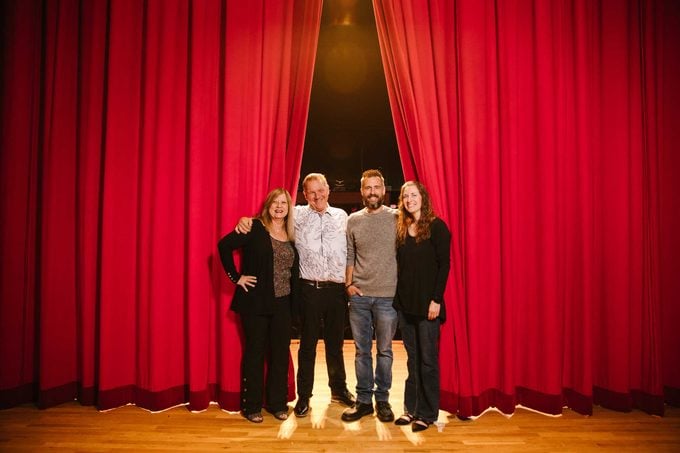
The Arthurs are huge Disney fans, so they decided to try The Little Mermaid. They had no idea what they had gotten themselves into.
“Ava, this little girl, came in with headphones on—she doesn’t like noise,” Salmen says. “We were playing Little Mermaid music in the background, thinking, This will be cool, and she starts screaming her head off, saying, ‘I hate that song!’”
Another actor was confined to a wheelchair and there was no way to get the person on stage.
“Our goal is to make every actor successful, one way or another, with accommodations, however it’s going to be,” says Erich Offenburg, the theater’s artistic director. In Columbiana, nobody gets left behind. The theater company set about raising money for a wheelchair lift.

For Ava, Offenburg took baby steps and, “Now, this little girl, she’s an actress,” says Salmen. “It went from night to day.”
Offenburg has a background in special education and has applied the same principles to his theater direction. All actors have an individualized plan tailored to their strengths and are assigned an attendant who helps make them successful on stage.
“We have folks who are nonverbal, we have folks who are not very sociable, we have folks who can’t see, we have folks who can’t hear,” said Offenburg. “Some kids, once they learn the part and know what’s going on, the attendant ends up standing off to the side. In some cases, you’re literally feeding every word to the actor.”
It works.
“To me, it feels very dazzling,” said Gabriella Levine, 19, who was Adelaide in Guys and Dolls and Miss Hannigan in Annie. “I love singing to a lot of people and I want to sing out my heart to them.”
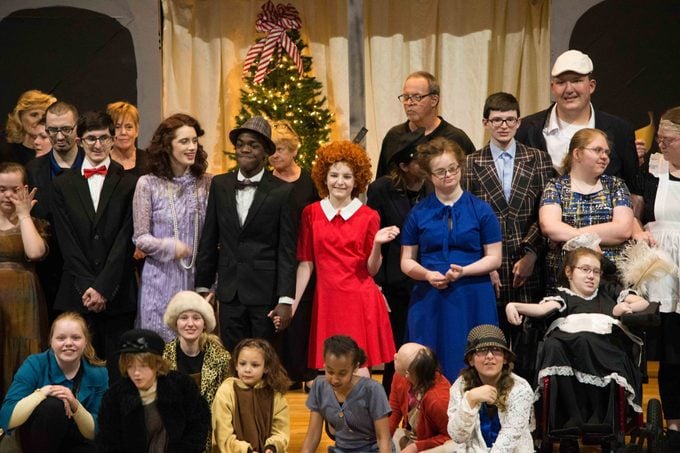
For many of the families, the theater is a place where their special-needs members can find community after they’ve exited the school system.
“Dustin doesn’t have a lot of extra activities in life, so when we heard about this, we came,” said Jill Snyder of her son, Dustin, 23. “It’s a godsend. He turns into a different person when he comes to the theater.”
For Seth Rossi, 14, it was just a matter of teaming up with the right creative partners.
“When Seth was little, we were looking for something for him to be involved with. He’s artsy. He’s a born actor,” said Erin Rossi, Seth’s mom. Seth has trouble hearing and being understood when he talks. In Disney’s Mulan, Seth was Mushu, the male lead. “After that play, I went to the restroom and I heard people out there talking about how he stole the show,” says Rossi. “It was awesome.”
People in town say that the special-needs shows are the best ones at the Main Street Theater. At first, Crown did one a year with a single performance. Then two shows, two performances. Shrek, the theater company’s ninth show, will run on October 24 and 25 and will be performed three times. After putting $1 million into the theater and the business, Don says that the venture now turns a small profit and will sustain itself into the future.
The success has been part of an overall rejuvenation of the town.
Rollin Gosney, another native son of the rising generation, has been buying up properties all along Main Street. His vision for the area is dependent on the success of the theater: “Upscale family entertainment, food, nightlife.”

He’s offering a year rent-free to any business that wants to launch on Main Street and has a good plan.
“I don’t think anybody should be left behind,” said Gosney, adding, “We all have our hurdles.”
One success is Birdfish Brewing Company, a microbrewery that now has two locations in town, a feat given that Main Street was dry until recently. When Jared Channel and brothers Jon and Josh Dunn opened the first location almost five years ago, they were barely making ends meet and could afford to keep the doors open only two days a week. But they wanted to share whatever success they had, so they started Tips for a Cause, a program to donate a day’s tips every month to a different charity.
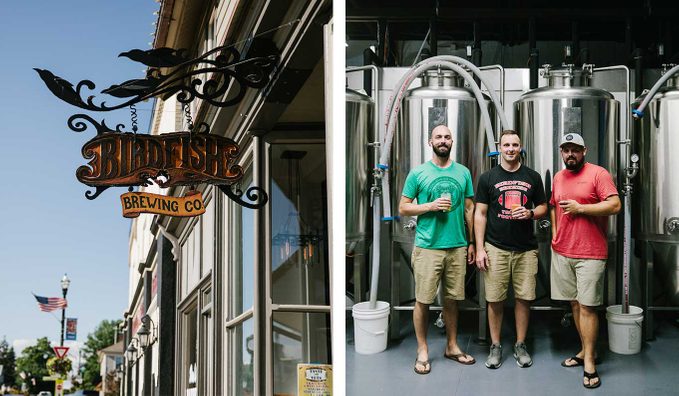
The American Cancer Society received $1,038 the first month. The Akron Children’s Hospital recently got a check for $3,779.
“We opened a business to have fun, and if we can help the community, too, why not?” Jared Channel says. They don’t just donate money. They also give the grains left over from the brewing process to Hogan’s Baking Company. Owner Shawn Hogan then shares the love by giving 1,000 hot dog buns to the annual picnic fund-raiser for Heroes and Halos, a nonprofit that supports families with special needs—everyone from children with autism, parents with dementia, or a relative with cancer.
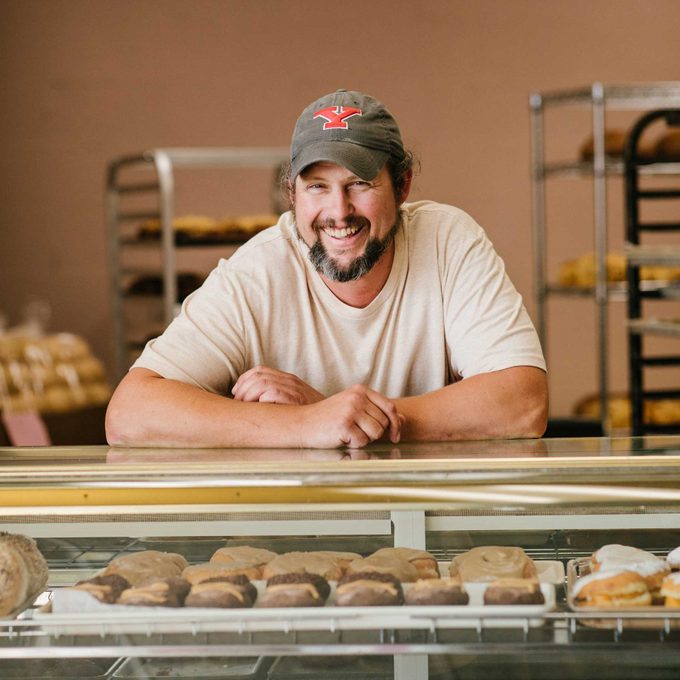
When asked why he pitches in, Hogan hesitates, almost as if the answer is too obvious to put into words. “When there’s a need,” he says, “you help out.”
The proceeds go toward helping Heroes and Halos put on its annual special-needs ball.
“Everything that we do is free for our families,” says Kelly Hephner, who heads up the organization. “We have people who donate ball gowns and tuxes and suits. We have a DJ who donates his time. People come in and donate the same things every year: desserts, macaroni and cheese, salads. People just line up.”
One local makes a unique donation.
“We had a young lady who has hip dysplasia, so one hip is higher than the other,” Hephner says. “We have a seamstress in town and he ripped apart a dress and sewed it on her so she could feel beautiful for the ball.”
It’s the kind of thing you do when you live in Columbiana.
In November 2018, an ice storm left tens of thousands of people without power or heat. The town owns its own utilities and had power back up before the private companies in the area. When emergency authorities called Columbiana to check in, instead of another town that needed help, they found a helping hand. A regional warming and aid-distribution center was set up at the Upper Room Fellowship.
“We got all the residents from [the neighboring town of] East Palestine from old-folks’ homes and put them up in our facility,” says city manager Lance Willard. “We needed food too. We called Greenford Christian Church and they have a food pantry and we said we have 11,000 people without food and they said, ‘You know where the key is.’”
Aker, the pastor at the Upper Room Fellowship, says that many of the churches in the area have a strict philosophy of focusing on three things: a relationship with God; a relationship within the congregation; and a relationship with the wider community, regardless of faith.
“If the church isn’t making an impact out on the world, what are we doing?” said Aker.
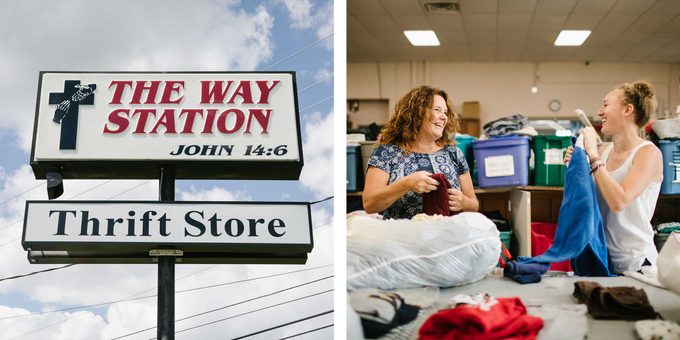
Across the street from the Upper Room Fellowship is a nonreligious aid organization called the Waystation. In 1987, a Sunday-school teacher named Jim Couchenour Sr. went searching for his alcoholic friend. Couchenour found him in a local dive bar called the Way Station, along with others in need of counsel. Couchenour became a teetotaling regular, setting up what he called his “bar ministry.” When the bar shut down, he bought the building that housed it and turned it into a clubhouse of sorts for people to come get sober, with the help of a sympathetic ear—Cheers without the booze. The clubhouse eventually outgrew its original mission, and today the Way Station’s services include a thrift store, a food pantry, a support group, a treatment facility for teens addicted to drugs and alcohol, and a jobs center.
“We do a gala every year, and it’s supported by all the businesses in the area,” says Vicki Ritterspach, Couchenour’s daughter, who runs the Waystation. “They all know what the Waystation does. There’s not this ‘not in my backyard’ attitude. People in Columbiana genuinely care.”
Perhaps Columbiana’s greatest symbol of this giving instinct is Firestone Park. Harvey Firestone was born on his grandfather’s farm here in 1868, and while he set up his manufacturing business in Akron, Ohio, he never forgot his hometown. He vacationed here (often with fellow industrialists Henry Ford and Thomas Edison), and in 1933 he donated part of the family homestead to create this oasis. It features a pool and waterslide, baseball and football fields, a track, and walking trails lined with deep brick gutters filled with fresh spring water—relics from the days when folks would water their horses here.
This crown jewel had tarnished a bit over the years. Pat Tingle, who was born, raised, and married in Columbiana, noticed the changes in 2000. An educator, she spent most of her adult life moving around the country with her husband, Brad Tingle, an executive with UPS. When Brad retired, there was only one place he wanted to be. “My husband said, ‘Let’s go home,’” Pat says.

The Tingles lived happily in Columbiana for many years. But Brad died in 2014, and their son, David Tingle, passed away three years later. “When I lost them both, I wanted to do something special for them and something special for the town,” Pat says. She cashed in some savings, added much of her husband’s life insurance money, and donated her remarkable nest egg—$500,000—to spruce up the family’s favorite spots.
“I always tell people I’m never sorry I came back. There’s something very good and solid about Columbiana,” Pat says while eating ice cream on one of the new park benches overlooking Mirror Lake and a plaque that honors her son’s memory.
“I dedicated it to him and the people of Columbiana who grew up with this park and the future generations who will grow up with it,” she says. “Everyone has a place here.”
Even folks who aren’t from town get caught up in the spirit. When you visit Columbiana, everyone will tell you that you have to go see Hippley Gardens. It’s not a place on any map, and you have to walk through some driveways and backyards to get there, but you will be most certainly welcome—and it’s worth the trespass. John Hippley runs a landscaping business and owns a few properties in town. In 1999, he decided that since the county had no botanical garden, he would build one himself in the adjacent backyards of the homes he owns.
“I got started by accident, and people started coming, and as more people came, I thought, Let’s just keep going with this thing,” he says.
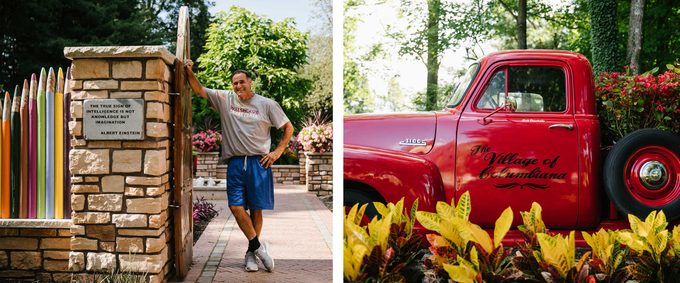
First it was an elaborate outdoor miniature train set, complete with tunnels and a water wheel. Then he added a full-sized dollhouse. After that, the children’s garden, with a life-sized Monopoly board and a piano that you play by walking on it, like in the movie Big. Then came the yellow brick road, surrounded by life-sized characters from the Wizard of Oz. There’s the old, red pickup truck that’s been turned into an elaborate planter. There’s the basketball court and the clubhouse, with a pool table and arcade games. All are open to the public and free to use—even for events like weddings.
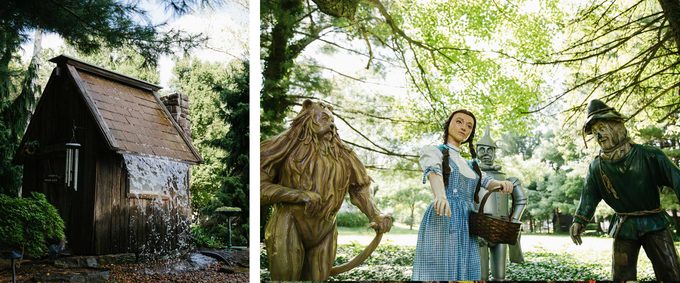
Hippley spends much of his spare time and money on the garden. He keeps his landscaping employees busy in the winter by having them help build the structures. More is planned, including a “ruin garden,” which will be a garden growing in the “ruins” of an old building. It will house an amphitheater, and Hippley plans on letting Crown Theater Productions make use of it. Best of all, Hippley is creating a foundation that will own the park and maintain it for the citizens of Columbiana and their guests in perpetuity.
The town has so much that other places lack—thanks to the generosity of its residents. The police department now has a K-9 unit, a dog named Csuti, trained to sniff out opioids. Getting Csuti cost $60,000, but to the residents of Columbiana, it was a necessity. The money was raised in two months.
“The smallest donation I got was $5, a woman on a fixed income who has been long retired,” says Columbiana Police Chief Tim Gladis. “Tornadoes, floods, fires, there’s never a shortage of people who want to help. In fact, we often get more people than we can actually deploy or need.”
Gladis didn’t grow up in town, but that’s no matter in the Nicest Place in America. Just ask Ruichiro Takamoto. He came to Columbiana as an exchange student from Japan and lived with the mayor, Bryan Blakeman. His story is almost too perfect to believe.
“Everybody said hi and talked to me even though I couldn’t really speak English,” he says.
He quickly became part of the fabric of the school community. He joined the cross-country team and was an immediate star. That helped him get a date for the homecoming dance and gave him the confidence to do something few American teens would do in a new school: try out for the football team.
The roster had long been decided, but the coach gave him a shot. He turned out to be such a good kicker that they let him join the team. He saw his first action on homecoming weekend. In that game, he scored on his first extra-point attempt and, at half time, he was named homecoming king.
“These are kids in their senior year of high school,” says Blakeman. “They took every other person and decided to choose him.”
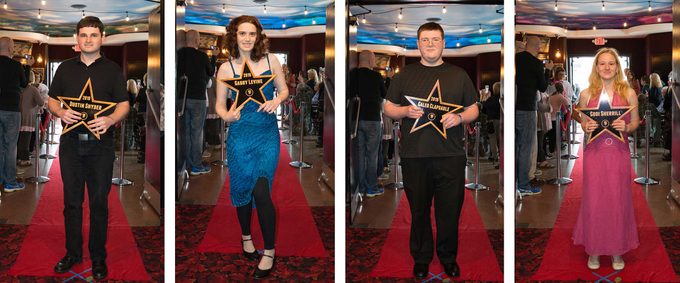
From the next generation about to take the wheel to those currently running the town, everyone is made to feel like they’re an important part of this community.
Jerry Sherrill, a welder whose daughter, Codi, is one of the special-needs actors, says that everyone gets treated the same. “The guy next door is the same as the guy that owns the business. Everybody seems to help one another in some fashion.”
Codi, 21, is a part of the fabric of town life too. In addition to starring in the Crown Theater shows, she’s also on a cheerleading squad and has a job at the local McDonald’s.
Everybody wants to be a part of things, locking arms in community.
For Caleb Clapsadle, one of the theater kids, it was intuition that brought him into that community. Before the theater, his only experience in front of a crowd had been reading a Mother’s Day poem at church, and it didn’t go well.
Caleb has Asperger’s syndrome and often has trouble connecting with others. “He just kept his head down and read it as fast as he could,” says his mother, Carla Clapsadle. “When he finished, he said, ‘I’m never going to talk out in front of everybody again.’ ”
But his mom heard about the Crown Theater special-needs show and asked him if he wanted to try out. Caleb was supposed to go trick-or-treating that night, but something told him to try again.
“It’s like my heart was saying goooooo,” he says. “And I did, and I’m not stopping.”












